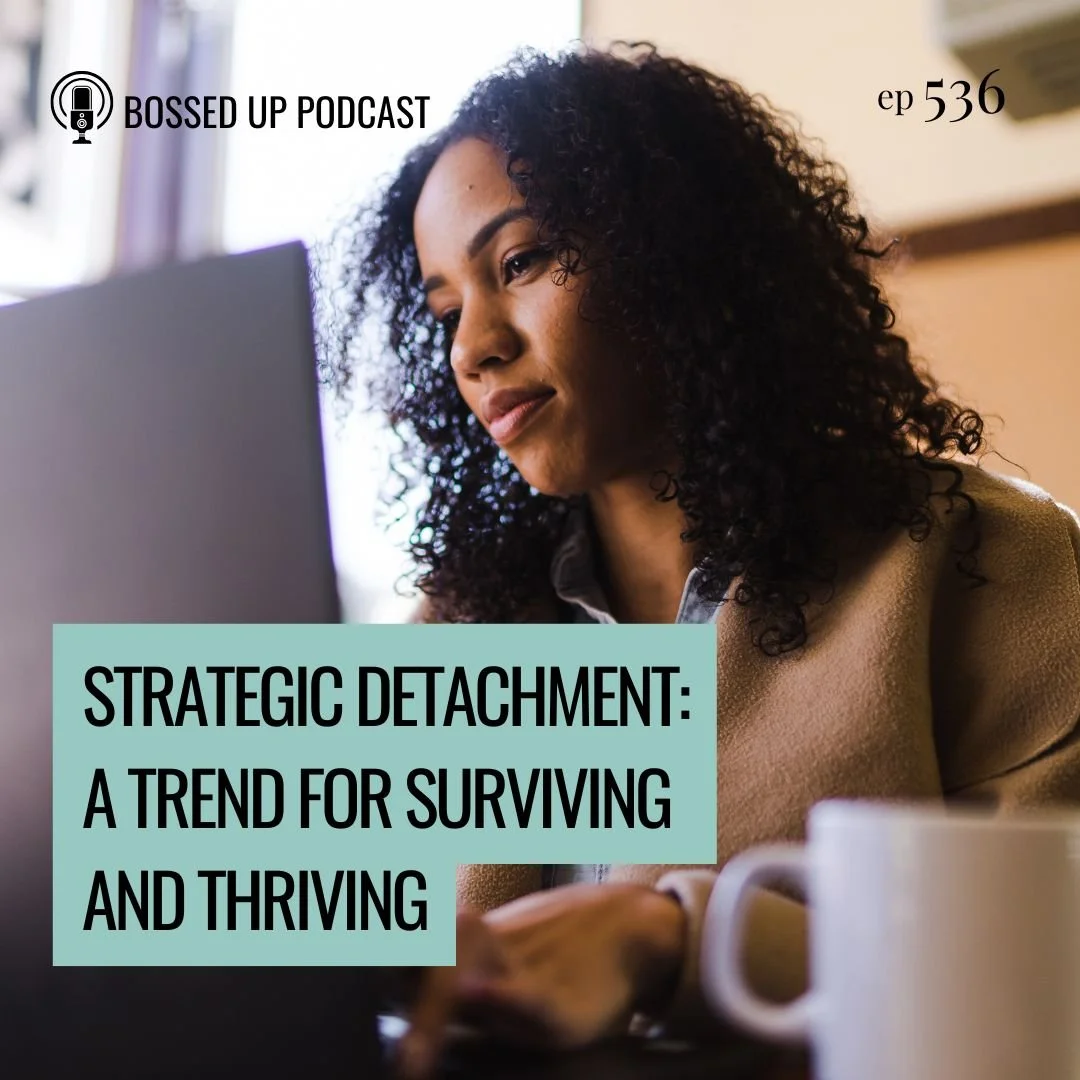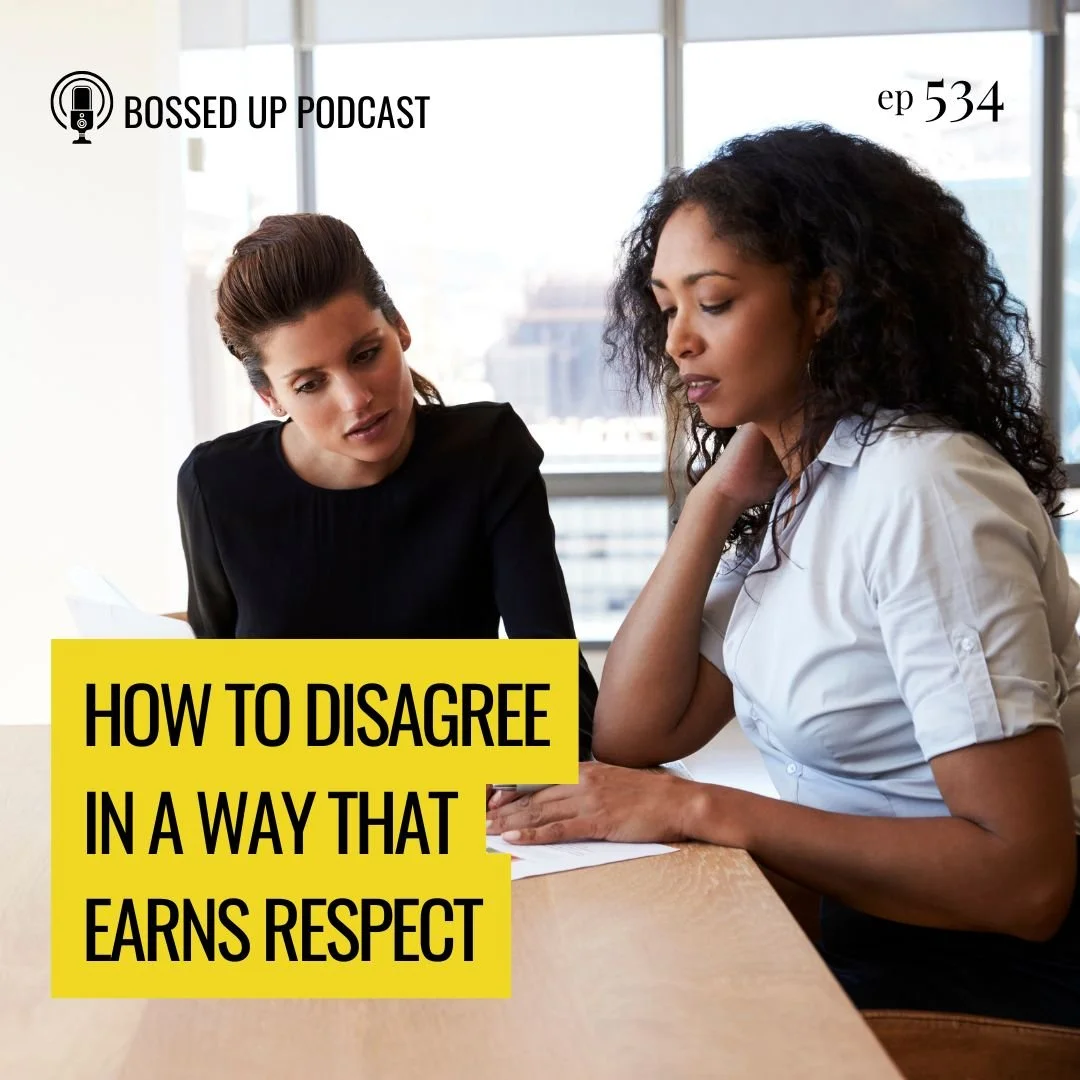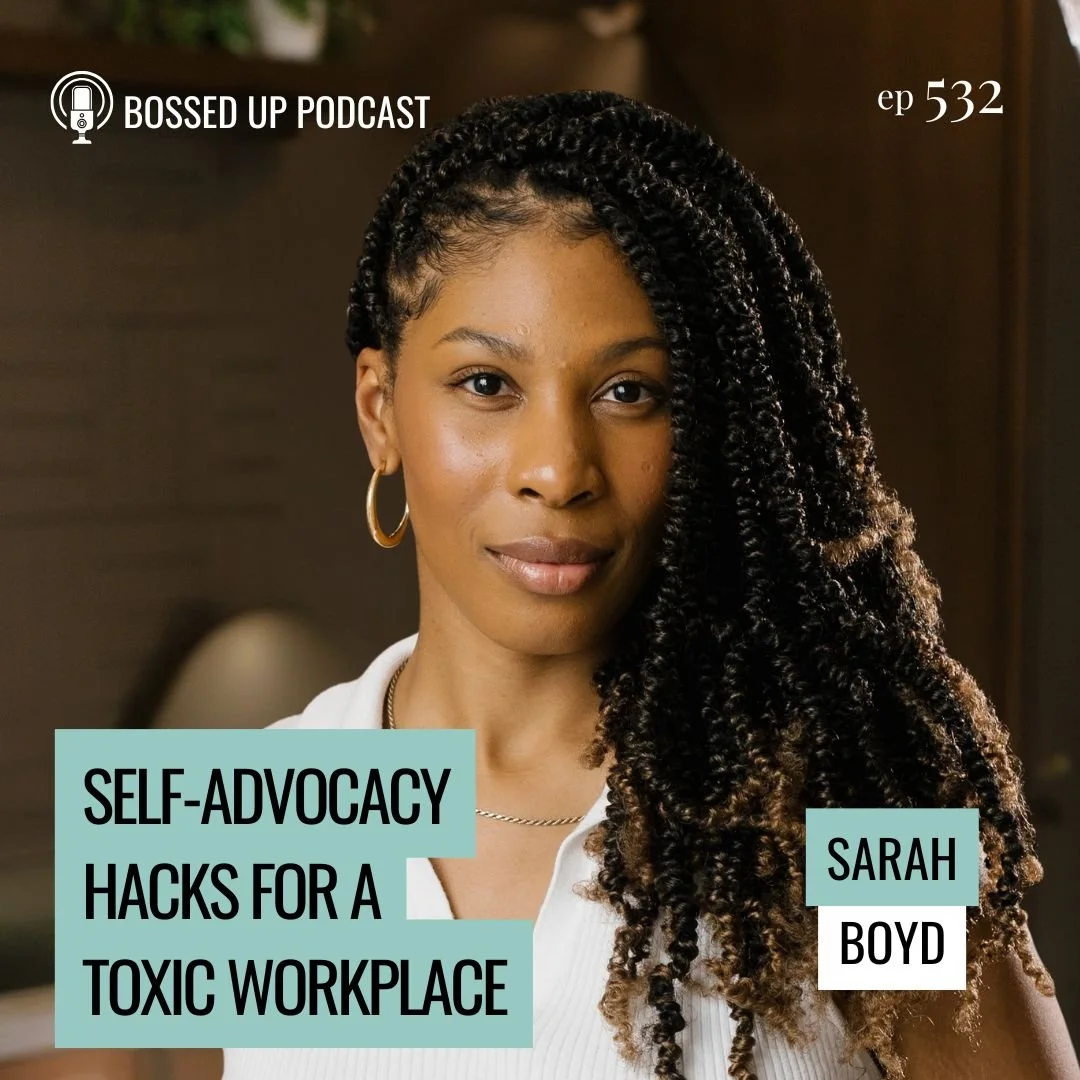How to Move Past Taking Things Personally at Work
Episode 485 | Author: Emilie Aries
What’s your approach when you get hung up on a mistake or criticism at work?
We’re all human, which, unfortunately, means when we screw up or receive less than glowing feedback at work, we have a tendency to take it personally. Let’s look at how we can approach these inevitable and often upsetting experiences in a healthy way that breeds resilience, empowers positive change, and sets us up to be stronger in the future—both in and beyond our careers.
Step One: Check the facts
Whether it’s a clear mistake on your part or unexpected negative feedback, those bad career days can quickly take their toll. If you find yourself spiraling into anxiety, overthinking everything you have ever done that might have landed you in this situation and questioning your ability to function as a human…you aren’t alone. But we need to press pause on this reaction.
Rather than leaning into a possibly made-up narrative that supports your personal failings, get down to brass tax. What actually happened? Recount that story in writing, out loud to yourself, or to someone you trust. Phrase everything around what you did or didn’t do, not who you are. Per Brene Brown, move away from long-lasting, insidious shame (I’m a screw-up, I always do this) to shorter-term, practical guilt (I missed that deadline).
To reframe the narrative, ask yourself these questions:
What are the facts of the situation?
Who told me the story I’m telling about myself now?
Once you’ve distinguished between the anxiety-driven story and the objective facts, you can move on to step two.
Step Two: Name and feel your feelings
Don’t discount any of the feelings you’re feeling. Instead, identify them. Do you feel embarrassed? Regretful? Frustrated (who else here is a frustration crier)? Once labeled, they can be expressed aloud, to yourself or that trusted someone.
Working on this emotional intelligence skill that’s essential to your resilience will help you begin to self-regulate, and it’s only from here that you can really make a plan for how to move forward.
Cue step three.
Step Three: Get a game plan going
Steps one and two are helpful whether or not the issue is something you ultimately want to address (I’m thinking of the experience I shared in Episode 467, How To Handle Negative Reactions When You Speak Up—not all feedback is worth internalizing). Step three, however, applies to situations where you recognize, from level-headed reflection, that there’s something to be learned and to try differently next time.
Ask yourself what it is you want to change. Is it specific to this situation, or is it a larger systemic issue, like “be more prepared for meetings”? Then, start working on how you’re going to implement those changes.
We can only grow our Boss Identities and confidence in our abilities if we take risks and, in those instances where the risk doesn’t perfectly pan out, reiterate and try again. If we shrink away from every mistake and our only takeaway is that we shouldn’t attempt that again, we can’t thrive.
In this episode and throughout this podcast, I talk a lot about what and how we can learn from challenging or painful experiences without ignoring or steamrolling over them. As established and aspiring leaders, we can all benefit from actionable ideas for building these skills, and my book, Bossed Up: A Grown Woman’s Guide to Getting Your Sh*t Together, is full of them. Support me and your local bookstore or library—not to mention yourself—by checking it out!
We also learn from the experiences of others! Come over to our Courage Community on Facebook or join us in our group on LinkedIn to share your approaches and stories around the dreaded anxiety spiral and the resilience on the other side.
Related Links From Today’s Episode:
Episode 323, How To Lead With Emotional Intelligence book, “Permission to Feel”
Episode 467, How To Handle Negative Reactions When You Speak Up
LEVEL UP: a Leadership Accelerator for Women on the Rise
“Bossed Up: A Grown Woman’s Guide to Getting Your Sh*t Together” by Emilie Aries
LEVEL UP your confidence in your leadership skills:
-
[INTRO MUSIC IN]
EMILIE: Hey, and welcome to the Bossed Up podcast, episode 485. I'm your host, Emilie Aries, the Founder and CEO of Bossed Up. And today I want to talk about not taking things so personally at work.
[INTRO MUSIC ENDS]
Have you ever had an experience where you've gotten, like, kind of hung up on something that happened at work? Maybe a mistake you made, a piece of feedback that you got that was redirecting and didn't really feel very good to hear, or even just something as subtle as, like, the tone of voice that your boss spoke to you in. It's really common to take these things deeply personally, and it's really hard to separate out your identity, who you are as a person and how you feel about yourself and your worth from your performance at work, which, as a reminder, is just one part of who you are, right?
So today I'm really interested to kind of dive into this dialogue with fellow ambitionistas about how we can kind of de-center work from our identities a little bit and not get so personally hung up on anything that's going down at work, good, bad, or in between. Because certainly how you are perceived matters. Don't get me wrong, I think you're probably listening to this podcast because you want to advance your career and your leadership, and so managing perceptions matters, but letting that, like, kind of send you into an anxiety spiral of ruminating, overthinking and just kind of anxiety spirit. Spiralling into a pit of despair is just not serving you. And it's also not setting you up to do your best work. So, let's talk about how we can process some of those experiences in a healthy way.
The first thing to do when you catch yourself kind of spiralling into despair or rumination is to check the facts. I find it helpful to either write this down or just, like, verbally process it with someone you trust and love. By recounting exactly what happened. I want you to focus on what you did or didn't do, not who you are, right? So that sort of reminds me of Brené Brown's definition of guilt versus shame, which is when you're feeling shame, you're saying to yourself, man, I'm such a screw up. I can't believe I was late to this meeting. I'm always underprepared. I'm always rushing at the last minute. Why am I like this? God, I'm such a, you know, I'm such a flake, or I'm such a procrastinator. That's all shame. Because that's all about who you are, your identity.
If we can focus on what you did or didn't do, then this is more manageable because it's reframing shame as guilt. You're saying, man, I really didn't prepare for Thursday's presentation. You know, I didn't get gas in my car beforehand, and I realized only at the last minute when I was rushing to the office that I was running on fumes and missed the client meeting as a result. This actually happened to me when I was, like, 25 and really not on top of my s***, definitely ran out of gas on the highway in the left lane on my way to a really important pitch meeting that I missed because I failed to prepare, like, the most foundational ways.
And so, you can talk about what happened, what you did, what you didn't do, but reframe that away from the identity of who you are, okay? Because otherwise you're spinning this into this huge narrative about you, your work identity, as Herminia Ibarra might call it, your working identity. And then, like, it becomes this huge part of you, this bigger story that just tends to reinforce how fixed these traits are that can really leave you spinning out with nowhere to go, no way to process this.
So ask yourself questions like this. What are the facts of the situation? What happened? Who told me the story that I'm telling about myself? Right? And so, if you have kind of fallen into framing this around shame and who you are, where did that story come from? Where is that story coming from? Once you can really differentiate between this broad narrative or this story that you're telling about yourself versus the specific facts of this individual situation, it can become a lot easier to sort through your feelings and find a path forward.
Which brings me to step number two. Identify and feel your feelings. I know I sound like a broken record, because this is totally Marc Brackett's philosophy in the book, Permission To Feel that I interviewed him all about on this very podcast. But it is so important, it's worth a reminder. Once you've separated out the facts of the matter, what happened? What did I do? What didn't I do? Now you can distinguish between those facts and your feelings about them. The first step is to recognize the feelings that you're having and to recognize them as distinct from the story of what happened or whatever it is that you did.
So I'm feeling embarrassed that I ran out of gas on the way to this important client meeting. I'm feeling regret that I didn't fill my gas tank the night before. I'm Feeling mostly frustration with myself, and my time management, and my skills in that moment. And I'm a frustration crier. So for me, when I'm disappointed in myself for not having taken the action that I aspired to take, for not rising to the occasion and being the best I can be, that's what makes me cry. [LAUGH] So if you can relate to frustration tears, we're similar in that way.
So once I recognize the emotion, understand the emotion is the next step. Like, of course I'm feeling disappointed in myself. This was an important meeting. I was really looking forward to this meeting. So, of course I'm feeling disappointed that it didn't work out. I can understand and validate my own experience of that feeling. And then the next few steps are to label, express and regulate. So once I can recognize understand the feeling, I'm going to label it with words beyond sad, mad, or glad, beyond those three sort of surface level feelings. I'm going to get deeper and label my emotions, including if necessary, printing off a feelings wheel and finding the feeling, you know, pointing to the, to the words that best describe the feeling you're feeling.
And then once I express myself, perhaps with someone I love and trust or just talking it out loud with myself, I can bring myself back to a place of self regulation, that is the emotional intelligence required to bounce back with resilience. When you make a mistake, which we all will, or when you get tough feedback, which will happen, especially if you're an ambitious woman who's constantly pushing herself outside her comfort zone. Only from a place of self regulation can you really make a plan for how to move forward. So if you suppress or deny, or ignore, or hide, from the feelings that you're having because they're too big, or they're too scary, or they're too negative, or you think you need to put on a happy face, you're not going to be able to process and move forward from here. So give yourself permission to feel, as Mark Brackett would say, and go through those steps to really give your feelings time to process so that you can get to a place of regulation.
Once you're there, step three is to figure out a plan for doing better or at least iterating trying something differently next time. This is part of a process that I get into in my book, Bossed Up all about expanding your identity by taking risks. Right? If you take a risk, you try something new, you get slapped in the hand, you get negative feedback, and then you don't make a plan for how to iterate on that and how to like mindfully move forward. You're just never going to try that again. You're going to become really risk intolerant, you're going to play small, you're going to shrink yourself, you're going to play it safe. And that is not how we grow, that is not how we succeed, that is not how we thrive.
So I really want to encourage you to think from a place of self regulation, from a place of self worth. What happened and what can I try differently moving forward? Is there anything I actually want to change or address? Or is this feedback that I don't feel like I should internalize, which is an option too. When I talked about handling negative reactions when you speak up back on episode 467 you know, I always want to make it clear that it's up to you to decide whether to internalize those negative reactions or to let them just roll right off you. [LAUGH] But really to do that from a mindful place of awareness and self awareness and self reflection. And so if you've reflected on what went down, like me totally blowing this client meeting because I didn't feel up my gas tank, you know what? Yeah, I would like to do some things differently next time.
So now it's about making a plan of action. Like what do I need to address with myself or others? Was this situation a reflection of a larger problem? For me back at 25, yes, it absolutely was. I was on the hot mess express because I was totally burned out and not taking care of myself. It wasn't just indicative of my gas tank my entire life. Fuel was low. I wasn't eating right, I wasn't exercising, I wasn't sleeping right. This was part of a systemic thing that needed to be addressed, which is why we're all here, by the way. This is why Bossed Up started, was through the story, is much more detailed in my book.
But once you've really identified, okay, what can I do about this? Make a plan. Make some steps. Like what can I take from this experience that may have been a painful one, but instead of burying my head in the sand and hoping it doesn't happen again, how can I make a plan to adjust? How can I put myself in the driver's seat, so to speak, and take away something productive from this? There are things that we can't change and then there are things that we can change. So it's your job in this iterative process of experiment, expanding your identity to identify the variables that you can change for next time. That way, even if this experience was painful. Even if this learning experience was a challenge. And, you know, you're learning here through trial and error. It's not for nothing you're taking something away from it and you're making a plan to do better next time. This is how you grow your boss identity, grow your confidence in your ability to figure things out, and grow from, yes, your own mistakes and missteps and challenges and even some of your most painful seasons of life so that you can grow from them and not hide from them.
For lots more on how to expand your boss identity, how to grow through challenges, and how to bounce back stronger so that you come out on the other end of these experiences ready to take risks, ready to make boss moves, ready to be the best you can be. Check out my book, Bossed Up: A Grown Woman's Guide to Getting Your S*** Together, which chronicles a lot of these learnings in very practical, tactical and actionable ways, all backed by evidence that you can make useful to you in your life and your career. You can find my book wherever books are sold or bossedup.org/book and I encourage you to support your independent bookstores and libraries whenever possible and let me know what you think.
[OUTRO MUSIC IN]
Let's keep this conversation going as always in the Bossed Up Courage Community on Facebook or in the Bossed Up Group on LinkedIn. And until next time, let's keep bossin’ in pursuit of our purpose, and together let's lift as we climb.
[OUTRO MUSIC ENDS]












